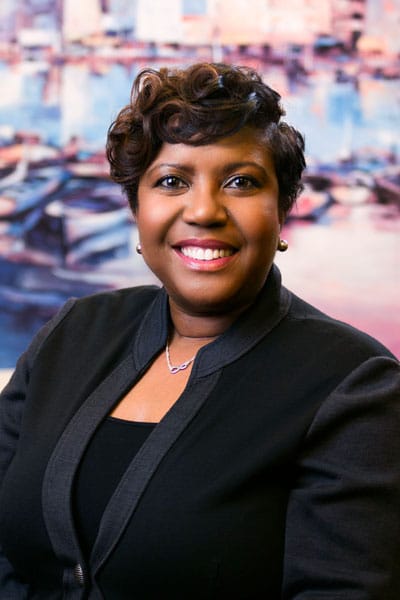Doctors and nurses aren’t the only healthcare heroes focused on improving the day-to-day lives of others. As senior vice president and chief human resources officer of Atlantic Health System, Nikki Sumpter knows that firsthand. Each day, Sumpter helps determine the best way to recognize and reward every member of the organization for their contributions, as well as to provide them with opportunities for development. In turn, her work helps Atlantic deliver affordable, inclusive care to individuals in the New Jersey area. Sumpter spoke with American Healthcare Leader about her unexpected route to the C-suite and human resources, how to encourage best practices in a large system, and the importance of a great birthday experience.

In what ways did your journey and experiences prior to joining Atlantic Health System prepare you for your role as chief human resources officer?
When I went off to college I first thought I would be an engineer because my father is an electrical engineer. I realized that it just wasn’t for me, but luckily my university also had a wonderful business school. I took several HR courses as electives and found I did well in them and loved it. From there, I accepted an internship with Wedge Capital Management and had a great HR mentor there. Upon completion of my bachelor’s degree in business administration, I landed a role with a staffing company. This experience provided me exposure to many industries and careers.
From there I answered a blind ad for a recruitment specialist position. When I received the call about the recruitment position it was with Carolinas HealthCare System (now Atrium Health). I had heard many horror stories about the healthcare industry and wasn’t sure if this was a good move, but I’m glad I ignored the stories. I ended up landing the recruitment position and that role helped to better inform my opinions about healthcare and the great quality of care offered at Carolinas HealthCare. I loved it and worked with an amazing team. I grew my career there for sixteen years, and I hope I ended up making Carolinas an even better place to work.
How did your career progress at Carolinas? What kind of opportunity were you looking for?
I moved from a recruiter to the senior team leader, to a director, to an assistant vice president of multiple facilities, and then I moved into a more corporate role. I was leading workforce relations and employee engagement in corporate and serving as a business partner to the executive team. During my tenure at Carolinas, I earned my master’s degree from Villanova and was contacted for a position in Texas. Even though Carolinas was one of the best places I ever worked, there was limited opportunity for me to grow quickly there. I went to Texas to join JPS Health Network, which was amazing as well. I led departments outside of HR, and it allowed me to be a more well-rounded business leader and a better executive.
While at JPS Health Network, I learned about the fascinating opportunity at Atlantic Health System. I’ve been blessed to be able to say that I have set my targets and achieved them.
Can you highlight any turning points that influenced your current role at Atlantic?
One of the major turning points in my career was getting my master’s degree. My parents encouraged me to pursue my master’s immediately after graduation, and I did not listen. When Debra Plousha Moore, chief of staff and former executive vice president, chief human resources officer, joined Carolinas, one of the things that she said to me was, “If you want to continue to grow, you must invest in yourself. It’s great that you have a bachelor’s degree, great that you’ve gone on to earn your certification in HR, but you need to go back and get a master’s degree.” That was the best advice and reinforcement I could have received.
Why does the world of HR strike a chord with you?
In HR I can be my authentic self. I have a passion for connecting with people in a meaningful way. I view relationships, whether professional or personal, as the best way to understand deeper human behavior. When I was younger, I read Nancy Drew stories where you have to predict behavior to solve the mystery. Applying that to people was so natural for me, and allowed me to help solve business issues. Creativity and innovation are also ingrained in who I am outside of work, and they just naturally spill over. I have been blessed to have a career that is not just work, it is a part of who I am.
What changes did you need to make to the HR function once you joined Atlantic?
I inherited a great team, but there was a need to create a contemporary function to support organizational transformation. In the past, HR had been performing an administrative function, and our strategy was pointing us in a different direction. We needed to have a lens toward the workforce of the future. We have to be really good stewards to help drive down the cost of healthcare and create affordability, access, and inclusion. To do this, I encouraged the team to focus on how Atlantic Health operates, and learn more about the different components of care delivery. I searched for leaders who knew how to build relationships so that we would always deliver exceptional service. The hard work was retooling some ingrained processes. The company is now invigorated by understanding how to support our caregivers and deliver great patient experiences, with the highest quality and safety. That has really been the key to our success.
What have you learned about yourself and the industry since joining Atlantic Health System?
I am the leader responsible for HR at Atlantic Health, but I am not just human resources. I’ve learned that I have a great strategic mind; I’m engaged in strategic conversations now at a more complex, larger system. I’m constantly learning, and at Atlantic Health I’m learning how New Jersey in particular deals with healthcare. It’s a high-cost area for healthcare, and it’s been rewarding to work closely with our CEO and operations team to figure out how we can reduce the cost of care and increase inclusion. We’ve needed to focus a lot more on the disruptors coming into the healthcare environment, and it’s causing us to look at things in a different way. We need to not only focus on inpatient settings but also on the wellness component and the move from volume to value. We also need to use our metrics to operate differently.
Can you tell me about the birthday recognition project you recently started?
When I was growing up my grandmother always told me, “No dry cards!” I was told that when you receive a greeting card, one of three things should happen: you should either shout with excitement, you should cry, or something should drop out of the card. When I began with Atlantic, I received a postcard in the mail acknowledging my birthday. The card was redeemable for $5 and it said, “Happy birthday from Atlantic Health.” It was a nice card, but none of those three things happened for me. So, we held a birthday card contest where we asked team members to have a young child in their life draw a birthday card for our team members. We selected twelve winners, and recently I visited one of our medical centers alongside one of those children to celebrate and thank them for being an artist for us. We also decided to box these cards to sell on our website, and proceeds will benefit our employee relief fund.
Generally, I love celebrating with our team and recognizing them for their great work. I have one of the best teams in healthcare, and I am just there to support them and make sure there are no barriers to their success. I feel like I’m their biggest cheerleader. For me it’s about showing love, being a servant leader, and supporting the team.
Photo by Dave Martin

